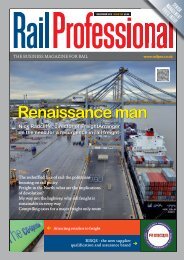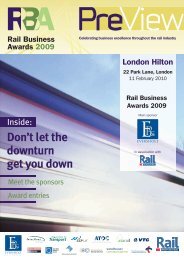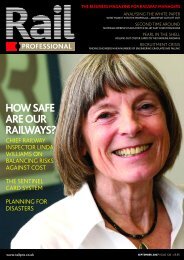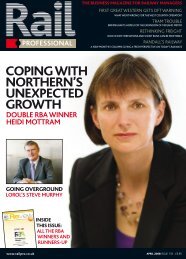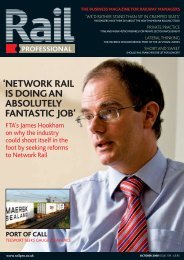View as PDF - Rail Professional
View as PDF - Rail Professional
View as PDF - Rail Professional
You also want an ePaper? Increase the reach of your titles
YUMPU automatically turns print PDFs into web optimized ePapers that Google loves.
Opinion<br />
In the p<strong>as</strong>senger seat<br />
The public gets<br />
what the public wants?<br />
Anthony Smith considers the one-sided nature of the customer complaints process, which leaves<br />
p<strong>as</strong>sengers feeling powerless<br />
What do complaints tell you about an industry?<br />
P<strong>as</strong>senger Focus takes on around 3,000 c<strong>as</strong>es a<br />
year where p<strong>as</strong>sengers are unhappy with how<br />
the train company h<strong>as</strong> handled their complaint.<br />
The complaints we receive are a tiny subset of all those<br />
made to train companies. Complaints are more often from<br />
leisure p<strong>as</strong>sengers, who take less frequent journeys – usually<br />
with higher one-off ticket prices, than from commuters.<br />
E<strong>as</strong>t Co<strong>as</strong>t, by no means the largest train company, h<strong>as</strong><br />
again topped the league with over 770 complaints to us<br />
in 2011-12. We are now working with it and other train<br />
companies to reduce these figures. Virgin and First Great<br />
Western followed with over 279 and nearly 240 respectively.<br />
The main issues complained about? Fares and ticketing,<br />
complaints handling, performance, and staff conduct<br />
and availability.<br />
Some companies take the view that it is best to take the<br />
heat out of situations, say sorry and make a relatively generous<br />
offer up front. Others view the whole exercise <strong>as</strong> a chance to<br />
generate more revenue – the notion that someone might be a<br />
loyal customer who h<strong>as</strong> made an honest mistake seems alien.<br />
Some have trouble in even replying.<br />
That so many complaints are about the complaints process<br />
itself is depressing. Familiar themes emerge: failure to read<br />
or address the issues raised seems a common complaint. By<br />
spending a lot of time and effort we are managing to get<br />
nearly nine of our 10 p<strong>as</strong>sengers satisfied with the way we<br />
have dealt with their complaint, if not the final outcome.<br />
The attitude of<br />
some train companies,<br />
detailed in our recent<br />
Ticket to Ride report, is<br />
still feeding through<br />
to the complaints<br />
reaching us. Even<br />
in the total absence<br />
of intent p<strong>as</strong>sengers<br />
are being hounded<br />
to pay absurdly high<br />
fines, often with the<br />
threat of prosecution<br />
thrown in. However,<br />
discussions are taking<br />
place with Atoc about<br />
‘The train company<br />
can run trains<br />
late, short, with<br />
no catering, no<br />
information and no<br />
staff - you have little<br />
comeback’<br />
drawing up an industry code of practice for how unpaid fares<br />
notices are dealt with.<br />
Customer service seems to have gone out the window,<br />
thanks to the toxic mixture of high ‘fines’, guards incentivised<br />
to collect the fines and the outsourcing (and consequent loss<br />
of oversight) of revenue protection work. Train companies<br />
need to urgently re-establish their grip on this most delicate<br />
<strong>as</strong>pect of the p<strong>as</strong>senger relationship.<br />
It is e<strong>as</strong>y to see how p<strong>as</strong>sengers become frustrated with the<br />
one-sided nature of the relationship. When you buy a ticket,<br />
you enter into a contract designed for very different times.<br />
The train company can run trains late, short, with no<br />
catering, no information and no staff – you have little<br />
comeback. If you dare to forget to bring your railcard with<br />
you they are on you like a ton of bricks. This is unfair and<br />
unbalanced and leads to feelings of powerlessness and<br />
frustration.<br />
Most of the railway network is now operated by private<br />
companies. Perhaps it is time to rip up some of the conditions<br />
of carriage and byelaws and let train companies and p<strong>as</strong>sengers<br />
have a normal consumer relationship?<br />
Is it also right that the taxpayer h<strong>as</strong> to fund the effort to<br />
sort out train companies’ messes? There could be an argument<br />
for moving to a ‘polluter pays’ model. Sad to say, often<br />
threatening the bottom line forces change f<strong>as</strong>ter than more<br />
re<strong>as</strong>oned intervention.<br />
Anthony Smith is the chief executive of P<strong>as</strong>senger Focus.<br />
september 2012 Page 19



